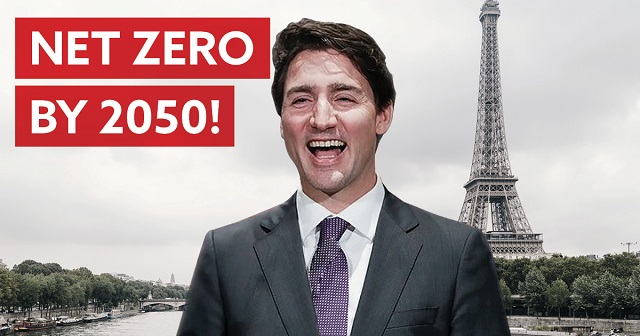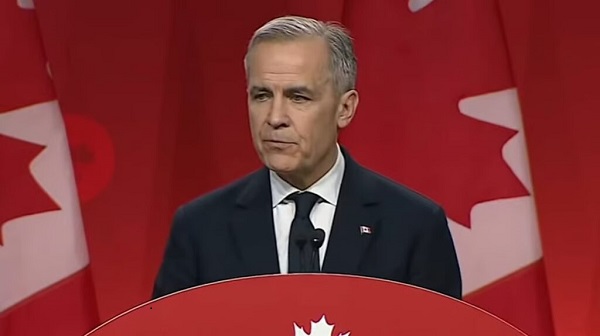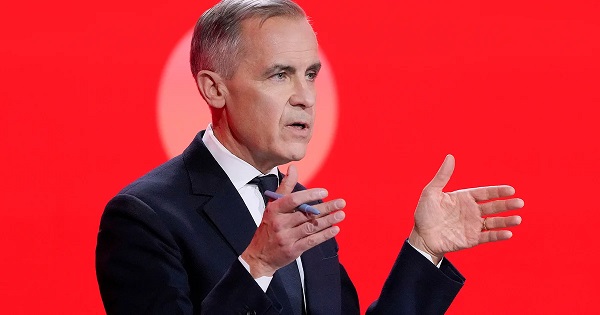Dan McTeague
Call out ‘net zero’ for what it is, a scam

From Canadians for Affordable Energy

Net Zero emissions by 2050. Have you heard this line? It is increasingly hard to miss. Every trendy business, bank, corporation and government boasts about their commitment to it. But what exactly do they mean by it?
In short, Net Zero by 2050 means our country either emits no greenhouse gases or offsets whatever it does emit through measures such as buying carbon credits or investing in carbon capture technology.
Net Zero has been a central project of groups such as the World Economic Forum, the United Nations and other globalist institutions. They’ve spent the past several years pressuring governments around the world to commit to Net Zero and to make those commitments legally binding, so it will be difficult for elected officials to roll them back in the future.
That’s what’s happening here in Canada. This has been a major priority for Justin Trudeau. The Liberals have spent years championing the push to Net Zero, mandating it by law in 2021.
But law or not, Net Zero isn’t actually going to happen.
It is a ludicrous goal, in part because achieving it would be unimaginably expensive. So expensive, in fact, governments the world over don’t even attempt to estimate the total cost. Whenever they’re asked, they just say “the cost of doing nothing will be higher.” But if they don’t know how expensive their own plan is, how on earth could they know that it would be cheaper than not doing it?
External estimates place the cost for Canada alone somewhere in the neighborhood of $2 trillion. That number is so staggering it is impossible to fully comprehend it. It is more than our nation’s entire Gross Domestic Product! Look at it this way — that is the equivalent of spending $1 a second for 63,417 YEARS.
But the fact Net Zero will ultimately fail doesn’t mean attempting it isn’t going to negatively affect your daily life. It will.
Under the umbrella of Net Zero you’ll find,
- Carbon taxes
- Clean Fuel Standards
- Just Transition
- Emissions caps
- Cancelled pipelines
- Electrification strategies
- Gas and diesel car bans
- Electric vehicle subsidies
- Costly building codes
- Curtailed food production
The list goes on and on.
But beyond the economic impact and the personal hardship, we must remember the end game of this Green Agenda isn’t really about reducing carbon emissions. No, it is much more insidious than that.
At the heart of this Net Zero movement is a desire to fundamentally change our economy and way of life. They are looking for a complete transition from the economy that has made Canada the great nation that it is.
“You will own nothing and be happy.” Remember those words attributed to Klaus Schwab, head of the World Economic Forum (WEF)? Well take those words to heart, because he means it.
The implications of Net Zero are broad and overreaching. And they will have the effect of fundamentally affecting our quality of life.
It will make energy more expensive. It will raise the cost of everything. It will make us less competitive in the global economy, especially against countries such as China because, you will not be surprised to learn, China has not signed on to this suicide pact. (But they are keen for other countries to stifle their economy in pursuit of this absurd goal, not least because they produce 70% of the world’s solar panels.)
Net Zero regulations, policies and mandates are a direct assault on affordable energy, and an affordable way of life. That is the goal of the Green agenda, and if they have their way, Canada, its standard of living and its way of life will suffer.
Net Zero is a scam.
Dan McTeague is President of Canadians for Affordable Energy
Dan McTeague
Carney… how he got the top job is a national scandal

 Dan McTeague
Dan McTeague
Remember that he is the founder and co-chair of the Glasgow Financial Alliance for Net Zero (GFANZ,) and its subgroup, the Net-Zero Banking Alliance (NZBA), which seek to harness the might of global finance to force Net-Zero on people who would never vote for it, and stop banks from investing in oil and gas projects, to the detriment of both their shareholders and the wider Canadian economy.
Well, the coronation is over, and it was exactly as anti-climactic as I expected it would be. The Liberals pulled out all the stops to get Mark Carney over the finish line, preventing real challengers from running, and carefully stage-managing the whole farce so that (with the notable exception of Frank Baylis) no one even attempted to discuss anything of substance.
And, after all of the water-carrying and kool-aid slinging, 150,000 people — in a nation of 40 million — got to choose our newest prime minister, a man who has never submitted himself to the voters, who doesn’t even have a seat in parliament.
It is a national scandal.
To me this is all a perfect encapsulation of what the Liberal Party of Canada has become since Justin Trudeau took the reins in 2013. As a decades-long member of that party, and having had the honour of serving as a Liberal Member of Parliament for 18 years, I can attest to the fact that it was once a party of practicality and diverse viewpoints — the most important kind of diversity there is — all ordered toward the good of our beloved nation.
But once Justin took over, on the strength of the Trudeau name, it quickly devolved into a cult of personality, built on hair and socks, and animated by fluffy, far-left magical thinking from which good Liberals were forbidden from dissenting. Out went practicality and any concern for good governance. In came the world’s “first post-national state,” and Net-Zero carbon emissions. Why? Because it is the current year.
Well, predictably, it all fell apart, though it took some time for Team Trudeau to spend down the capital we built up over the years, when better men and women were in power. And now that we Canadians find ourselves in a tough spot of his creation, Justin has handed the keys over to his hand-picked successor and co-conspirator, Mark Carney.
But aside from the man at the helm, what is actually going to change?
Nothing of substance.
Sure, Carney has offered some criticism of Trudeau’s Carbon Tax, but only once the public had soured on it. Even then, he began walking back his support by saying the Carbon Tax had “served a purpose up until now,” and he’s now pledging that his government will “immediately eliminate the consumer Carbon Tax,” which is to say, the portion of the tax which is most visible to voters.
That really is his problem with it — not that it makes it harder for working Canadians to gas up their cars, heat their homes, or afford groceries. No, it’s because the tax is paid by consumers directly, and so it’s too easy to see how it’s making our lives more expensive. Meanwhile, the industrial Carbon Tax, which is paid by businesses, will remain untouched, or perhaps raised, despite the fact that those costs will ultimately be passed on to the consumers.
This “sneaky” move is characteristic of Carney’s career thus far. Remember that he is the founder and co-chair of the Glasgow Financial Alliance for Net Zero (GFANZ,) and its subgroup, the Net-Zero Banking Alliance (NZBA), which seek to harness the might of global finance to force Net-Zero on people who would never vote for it, and stop banks from investing in oil and gas projects, to the detriment of both their shareholders and the wider Canadian economy.
This scheme came apart pretty quickly earlier this year, as banks in both the U.S. and Canada withdrew from Carney’s pet projects in response to accusations that they were engaged in collusion. But even so, this story tells us quite a lot about Carney’s “Green” elitist instincts.
These could be summed up as follows: Never trust regular people to make decisions about their own lives. Make those decisions for them, and at such a high altitude that they’ll have no one to complain to once they realize that something has gone wrong.
This is not the way to prosperity, especially with the perilous economic threats we’re currently facing. Trump’s tariffs have bite because Trudeau and Carney have left our economy in such a precarious state.
And now Carney is proposing that we go toe-to-toe with the world’s largest economy while continuing to smother our own economic vibrancy with essentially the entire Net-Zero superstructure intact — excluding, apparently, the Consumer Carbon Tax, but including the Industrial Carbon Tax, “Clean Fuel” regulations; Electric Vehicle mandates; and the heaps of legislation and regulations which impede our building new pipelines and selling our oil and gas overseas. It’s madness!
Unfortunately, Donald Trump is doing his darndest to help them attempt it. I’m skeptical of the current polling numbers which show the Liberal Party soaring. I know enough of these pollsters to know where their sympathies lie, and whom they owe favours to. But the Rally ‘Round the Flag sentiment is real. And the people who put Carney in power are hoping it will last long enough to keep them competitive in an election. Maybe it will.
Hopefully Pierre Poilievre’s Conservatives can stop that from happening. And their best bet would be to acknowledge what I’ve been saying for quite some time — that “Axe the Tax” is not enough. That the more they rely on piecemeal policies, bandaids for the gaping wounds in our economy, the easier it is for Carney and the Trudeaupians to just adopt their own twisted versions of them while ultimately changing nothing at all.
So Mr. Poilievre should pledge to not just Axe the Tax, but to Nix Net-Zero. The good of all Canadians, no matter their party, depends on it.
Dan McTeague is President of Canadians for Affordable Energy
Carbon Tax
Don’t be fooled – He’s Still Carbon Tax Carney

 Dan McTeague
Dan McTeague
Carney and the Trudeaupians in his cabinet haven’t had some kind of massive conversion. They’ve not done any soul searching. There’s no repentance here for having made our lives harder and more expensive. They remain ideologically opposed to Affordable Energy.
Over the next several days you will see headline after headline proclaiming that the Carbon Tax is old news, because Mark Carney has repealed it. ‘Promises made, promises kept!’ will be the line spouted by our bought-and-paid-for media, desperate to prevent Pierre Poilievre from winning the election.
Of course, this will be the same media who has spent the past few years declaring that Canadians love, are positively infatuated with, Carbon Taxation. So forgive me for scoffing at their sudden about-face, clapping like trained seals when Justin Trudeau’s newly anointed heir waives his pen and proclaims to the electorate that the Carbon Tax is dead.
The thing is, it’s not. It’s still there. And it will still be there as long as Mark Carney is running the show.
And of course it will. Mark Carney is an environmentalist fanatic and lifelong Apostle of Carbon Taxation. Just listen carefully to everything he’s said since he threw his hat in the ring to take over as PM. He’s said that the Carbon Tax “served a purpose up until now,” but that it’s become “too divisive.” He was careful to always pledge to repeal the Consumer Carbon Tax, rather than the entire thing. And in the end he didn’t even do that, just zeroed it out for the time being.
Carney and the Trudeaupians in his cabinet haven’t had some kind of massive conversion. They’ve not done any soul searching. There’s no repentance here for having made our lives harder and more expensive. They remain ideologically opposed to Affordable Energy.
The fact is, the only reason they’re changing anything is because we noticed.
They’re determined that that won’t happen again. The Carbon Tax will live on, but as hidden as it can possibly be, buried under every euphemism and with every accounting trick they can think of.
Trust me, we at CAE would be taking a victory lap if the Carbon Tax were really dead. We did as much as anyone – and more than most! – to wake Canadians up to what it was doing to our quality of life, our ability to gas up our cars, heat our homes, and afford our groceries. When the day comes that this beast is actually slain, we will have quite the celebration.
But that day is not today.
What happened, instead, was that an elitist Green ideologue shuffled the deck chairs on the Titanic in the hopes that the working people of Canada would miss the Net-Zero iceberg bearing down on us.
Don’t be fooled!
-

 2025 Federal Election1 day ago
2025 Federal Election1 day agoPoilievre To Create ‘Canada First’ National Energy Corridor
-

 2025 Federal Election1 day ago
2025 Federal Election1 day agoJoe Tay Says He Contacted RCMP for Protection, Demands Carney Fire MP Over “Bounty” Remark
-

 2025 Federal Election2 days ago
2025 Federal Election2 days agoChinese Election Interference – NDP reaction to bounty on Conservative candidate
-

 2025 Federal Election1 day ago
2025 Federal Election1 day agoHong Kong-Canadian Groups Demand PM Carney Drop Liberal Candidate Over “Bounty” Remark Supporting CCP Repression
-

 2025 Federal Election1 day ago
2025 Federal Election1 day agoLondon-Based Human Rights Group Urges RCMP to Investigate Liberal MP for Possible Counselling of Kidnapping
-

 Daily Caller15 hours ago
Daily Caller15 hours agoBiden Administration Was Secretly More Involved In Ukraine Than It Let On, Investigation Reveals
-

 2025 Federal Election1 day ago
2025 Federal Election1 day agoFixing Canada’s immigration system should be next government’s top priority
-

 2025 Federal Election1 day ago
2025 Federal Election1 day agoBeijing’s Echo Chamber in Parliament: Part 2 – Still No Action from Carney









